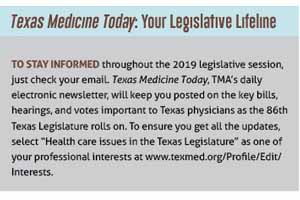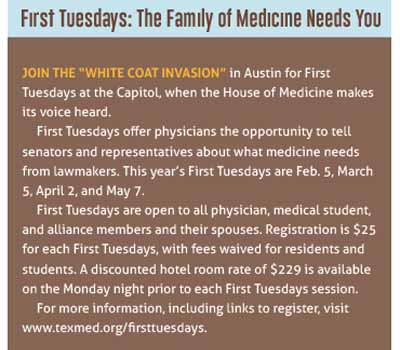
The faces at the Capitol change. The legislative flashpoints and fights come and go. But every two years, the House of Medicine’s commitment remains the same: Persuade legislators to improve Texas laws for physicians and patients.
The Texas Medical Association will keep that focus in 2019 as it pursues better Medicaid coverage for postpartum women, insurer accountability for narrow networks, more funding for community mental health, and many other aims.
When the 86th Texas Legislature convenes on Jan. 8, TMA will build on its major successes of 2017, renew some of the biggest battles that stalled two years ago, and tackle relatively new ones. (See “TMA’s 2017 Success: A Look Back,” page 23.) Physicians will make their case to a somewhat new makeup of lawmakers. (See “Legislative Affairs,” page 28.)
After the Democrats flipped seats in both state chambers in November’s elections — gaining 12 in the House of Representatives and two in the Senate — this year’s session will feature a somewhat more bipartisan legislature. Republicans still control a majority in both chambers, but at press time the new breakdown was 83-67 in the House and 19-11 in the Senate, with a December special election set to fill one Senate seat. And there will be a new Speaker of the House — most likely Rep. Dennis Bonnen (R-Angleton) — to replace outgoing Rep. Joe Straus (R-San Antonio).
Jason Terk, MD, chair of TMA’s Council on Legislation, says Medicaid will be a top-priority issue for the council. He thinks the new makeup of the Legislature bodes well for medicine’s push to get more money for Medicaid payments, which is part of the perpetually contentious budget process.
“It’s always a food fight. But I expect it,” the Keller pediatrician said. “In years past, of course, we have always supported improvement in payment rates. But I think that there’s a little bit different dynamic now, [such] that we potentially have a higher chance of getting some substantive improvement this year.”
From budgetary matters and insurance legislation, to public health gains and much more, here’s a look at some of medicine’s biggest goals.
A healthy budget?
Funding for Medicaid, behavioral health, and women’s health will be among medicine’s foremost budgetary focuses, though the legislature will be weighing such asks against its priorities for public school finance reform, Hurricane Harvey relief, state infrastructure needs, and lowering property taxes, TMA leaders say.
On the plus side, TMA lobbyist Michelle Romero says a better-than-expected economy has put the state in good position to cover the current budget’s Medicaid shortfall, estimated at $2-3 billion due to caseload growth, without tapping the state’s “Rainy Day” fund.
In September, state Comptroller Glenn Hegar announced that the fund was on track to reach nearly $12 billion at the end of 2019. That’s about 10 percent of the overall budget and the most in the fund since 2015. Sales tax and oil and gas revenue also were up.
The question is whether that positive economic outlook will continue, Ms. Romero cautions. The comptroller always issues another revenue estimate just before the session begins.

Medicaid, women’s health, GME
TMA President Doug Curran, MD, has made Medicaid the centerpiece of his presidency. TMA hopes lawmakers will take up that mantle with solutions to reduce costly red tape, streamline care coordination for the most complex patients, and improve coverage for the state’s working poor.
In addition, Medicaid’s low payment rates have depressed physician participation in the program. In written remarks to the Legislative Budget Board (LBB) in September 2018, TMA said it supports revitalizing Medicaid and Children’s Health Insurance Program (CHIP) physician networks, noting physicians haven’t received a meaningful payment increase in Medicaid in nearly two decades. (See “Medicaid Participation in Texas: By the Numbers,” page 25.)
But improving Medicaid coverage goes well beyond properly compensating physicians, and medicine will throw its weight behind other hoped-for improvements.
TMA will urge lawmakers to enact a maternal health platform also supported by the state’s Task Force on Maternal Mortality and Morbidity. David Lakey, MD, chief medical officer at The University of Texas System and previously chair of TMA’s Maternal Health Congress, says Medicaid currently covers low-income women for only two months after the birth of a child.
The task force has called for a federal waiver that would extend coverage to one year, which TMA supports.
“We know that moms are at risk during that first year afterwards,” Dr. Curran told physicians at one of five tele-town hall meetings on TMA’s legislative agenda in October. “So just increasing availability of services and care is going to make an enormous difference in outcomes.”
Among other budget-related items on TMA’s agenda:
- Revising eligibility and enrollment systems so adolescent females who age out of CHIP or children’s Medicaid can enroll seamlessly in the state’s Healthy Texas Women program;
- Ensuring that women who lose their CHIP perinatal coverage can connect to the state’s family planning program to avoid gaps in preventive care;
- Improving the availability of long-acting reversible contraceptives (LARCs);
- Funding for graduate medical education (GME) to maintain the target ratio of 1.1 entry-level-positions per medical graduate, which Texas achieved during 2018; and
- Expanding the availability of behavioral health services to children and adults, including substance use disorder treatment, and using innovative telemedicine initiatives. TMA also will support funding to expand the capacity of state hospitals and community mental health services.
The Texas Women’s Healthcare Coalition’s (TWHC’s) aims for this session are similar to much of TMA’s women’s health agenda. Evelyn Delgado, TWHC chair, says LARC availability is a benefit to women who decide they don’t want to be pregnant anytime soon, and a benefit to the state financially. (See “Leveraging LARCs,” page 26.)
Meanwhile, on GME, the recent boom of new medical schools in Texas makes it continuously important to work for the proper number of slots for graduates, Dr. Terk says.
“Otherwise, we’re just educating some other state’s physicians,” he said. “We know that physicians tend to stay where they train. So we’re going to need to watch that carefully and make sure that with the three or four new medical schools that are coming online now and in the next couple of years, that we don’t end up in the same situation we were in for several years previous, where we didn’t have enough GME slots.”

Insurance: Time for accountability
TMA’s biggest wins of 2017 came in the insurance realm, laying the foundation for more reforms during this year’s session. Victories on balance billing and step therapy were the headliners two years ago; now, it’s time to tackle medicine’s other top-line insurance goals, including:
- Prior authorization: On medicine’s agenda this year: Relieving physicians of the burden to get pre-approval for treatment or medication with legislation to ensure prior authorization requirements have medical relevancy — and aren’t just a way for health plans to deny care or delay payment.
- Network adequacy: Medicine will again push for action on two of the biggest causes of surprise bills: insurers’ narrow networks and their often out-of-date network directories. TMA will seek legislation to mandate that the Texas Department of Insurance (TDI) review insurers’ PPO products, which unlike HMOs and EPOs, don’t undergo any proactive review, TMA lobbyist Clayton Stewart says. Also, medicine will again ask to require insurers to update their network directories more frequently than the current mandate to do so every 30 days. “We at least need to know whether or not the physicians are out of network,” Mr. Stewart said. “That really benefits the patient, but also [would help] because TDI a lot of times will use those network directories to do a network exam regarding the adequacy of said insurance company’s network.”
- Pharmacy benefit managers (PBMs): Mr. Stewart says PBMs are essentially unregulated. Yet, they’re making health care decisions for patients — such as determining the step therapy protocols insurers use to keep patients off more expensive medications. Last session, Mr. Stewart says, many lawmakers weren’t familiar with PBMs and what they do. That changed with passage of a TMA-backed measure that dramatically slashed the amount of time an insurer generally has to approve a physician’s override of a step therapy plan. After examining and passing that bill, Mr. Stewart says, lawmakers are more versed on PBMs’ role in medication. So TMA expects to see more scrutiny of PBMs during this session and legislation to introduce more transparency and accountability for them.
Public health momentum
Few of medicine’s public health objectives gained traction in the 2017 legislative session. However, Dr. Lakey says momentum building behind some of medicine’s key campaigns could translate to action in the 2019 session.
Improving funding for the Texas Department of State Health Services (DSHS) is at the top of the list, he says. DSHS’ budget will determine the state’s ability to handle public health priorities such as disease control and disaster response. That includes support for bolstering the statewide child immunization program Texas Vaccines for Children, and maintaining the state’s current vaccine exemption requirements in schools and other facilities.
On vaccine exemptions, Dr. Lakey said, “It will be controversial, but there will be conversations there. And I think there will be efforts [by anti-vaccine groups] to require child care centers to accept children who are not immunized, and I think there will be pushback.”
Aside from the DSHS budget, Dr. Lakey says, four key areas offer openings to improve public health: reducing maternal illness and death; increasing the age for purchasing tobacco to 21; reducing the rate of obesity; and improving mental health services.
One measure to watch will be Senate Bill 63 authored by Sen. Jane Nelson (R-Flower Mound), which is designed to expand mental health care by creating a consortium of 12 of the state’s medical schools and health science centers.
“It will better utilize the regional academic centers in solving the mental health issues,” Dr. Lakey said. “As the chair of the Senate Finance [Committee], [Senator Nelson will] be in good position to make sure that bill gets the funding it needs to get implemented.”
In the TMA-supported drive to rebuild state hospitals, modernization will be important, says Ms. Romero.
“When they’re going to rebuild the state hospitals, they need to be built and planned where it’s not just the mental health that patients are being treated for — that it’s also their physical health,” the TMA lobbyist said. For example, “We’ve heard Rusk [State Hospital] is … not meeting the needs of patients today. It was planned 100 years ago, and so we need to look at how do you treat patients in the modern hospital, give them modern care.”
Scope of practice: They’ll be back
This is one fight that never stops.
Every two years without fail, nonmedical professionals back bills that would allow them to play doctor — that is, expanding their scope of practice beyond their training and expertise.
One reliable source of such legislation: Advance practice registered nurses (APRNs), who have consistently but unsuccessfully pressed for independent prescribing authority in recent sessions. TMA lobbyist Dan Finch expects this year to be no different.
“The nurse practitioners will be back,” he said. “We’ve told them that our core principle has remained the same: Independent diagnosis and prescribing is the practice of medicine. Physicians can delegate, but must supervise, because ultimately, they’re accountable.”
As always, the House of Medicine will take a stand against any bill that seeks to grant medical practice authority to nonphysicians of any profession.
Sunset and TMB (again)
Political wrangling left renewal of the Texas Medical Board (TMB) and the state’s Medical Practice Act up in the air at the end of the 2017 regular session, prompting Gov. Greg Abbott to call a special session. Fortunately, lawmakers averted medical anarchy in Texas by reauthorizing TMB and the state’s medical law — but for just two years, instead of the customary 12 that would’ve kept TMB on the standard cycle for Sunset Advisory Commission review.
That means it’s already time to renew TMB and keep the practice of medicine properly regulated past its current expiration date of Sept. 1, 2019. Medicine is hoping for a 10-year extension this time to get the medical board’s review back on the standard Sunset schedule.
As it has in recent years, medicine is asking for this year’s TMB sunset bill to improve transparency and due process for physicians implicated in the board’s disciplinary process, which TMA believes has become less fair over time. TMA supports eliminating the board’s one-per-lifetime limit on remedial plans for physicians, as well as making remedial plans more available for minor administrative violations.
Also, TMA will again advocate for a TMB complaint process for physicians employed by 501(a) nonprofit health care organizations who want to fight back against improper corporate interference in the practice of medicine. A 2017 bill to that effect, SB 833, passed the Senate but died in the House.
Making the PMP work
A mandate for physicians to check the state’s prescription drug monitoring program (PMP) looms later this year. TMA’s legislative aim will be to make that mandate as burden-free as possible for physicians.
As things stand now, starting on Sept. 1, prescribers will be required to check the PMP before writing any prescription for opioids, benzodiazepines, barbiturates, or carisoprodol. But at TexMed 2018, TMA’s House of Delegates adopted policy to advocate for initially limiting the mandate to Schedule II drugs. TMA will work to convince lawmakers that’s a more sensible approach.
Medicine also is stressing the importance of integrating the state’s monitoring program, PMP Aware, into physicians’ electronic health record (EHR) systems. Mr. Finch says that’s the ultimate long-term solution to making a mandatory PMP check work, and EHR integration is already happening in other states.
“Texas would be the biggest state to undertake it,” he said. “But it is clearly where we want to go, because it creates an opportunity to use the PMP as a clinical database without an intrusive workflow imposition. It’s a click away, as opposed to stopping a patient care encounter to go do something in [the system and] return. And it’s not because it’s an unreasonable imposition. It just comes on top of every other reasonable imposition that takes away from doctors’ time with a patient.”
SIDEBARS
TMA’s 2017 Success: A Look Back
Here are several of medicine’s priority bills that became law following the 2017 Texas Legislature:
Senate Bill 507 by Sen. Kelly Hancock (R-North Richland Hills) greatly expanded the availability of balance billing mediation.
Senate Bill 680 by Senator Hancock and sponsored in the House by Rep. Greg Bonnen, MD (R-Friendswood), allowed a physician to continue prescribing a medication that’s effective for a patient even if an insurer’s step therapy protocols call for the patient to switch medications.
Senate Bill 1107 by Sen. Charles Schwertner, MD (R-Georgetown), established a statutory definition and framework for telemedicine in Texas and clarified that the standard of care for telemedicine services is the same as for a traditional, in-person medical visit.
Senate Bill 1148 by Sen. Dawn Buckingham, MD (R-Lakeway), eliminated many of the burdens associated with onerous maintenance of certification requirements.
Senate Bill 62 by Rep. Tom Craddick (R-Midland) banned texting while driving statewide.
Medicaid Participation in Texas: By the Numbers
Increasing physician participation in Medicaid is one of TMA’s top priorities. According to TMA’s 2016 Survey of Texas Physicians:
45% of physicians treat Medicaid managed care organization (MCO) patients
60% of physicians who don’t accept those patients avoid doing so because of inadequate payment
20% say they would accept more Medicaid MCO patients, and 35% say they would consider it if payment rates increased by 5 to 10 percent
55% say they’re likely to accept more Medicaid patients if the program decreased its administrative burden
Tex Med. 2019;115(1):20-25
January 2019 Texas Medicine Contents
Texas Medicine Main Page